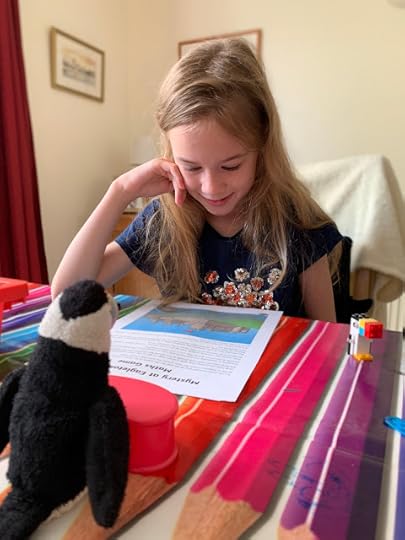Tim Atkinson's Blog, page 6
October 8, 2020
National Clean Air Day 2020
Another week, another National Day, this time a day for all things clean air, particulate free, fresh, and fragrant. Actually not fragrant, or not necessarily. Just clean and healthy. Because today is National Clean Air Day 2020.
Air pollution is the biggest environmental threat to health in the UK. At least 30,000 deaths are linked annually to air pollution. It's especially bad around schools, where the tiny toxic particles (PM2.5s) combine with Nitrogen Dioxide and other gases to form a potentially deadly chemical cocktail for our children.
It used to be thought that the the brain stem kept such particulates in the blood at bay, preventing them from reaching the brain. Used to be. Some of these particles are 40x thinner than a human hair, a fact that it has now been confirmed sees them damaging not only our heart and lungs but our brains as well.
Lockdown led to a widespread improvement in air quality. Fewer cars and lorries led to all sorts of wonderful gains, like an estimated 11,000 fewer dirty air-related deaths. That's quite something. It'd be a shame if such advances were lost in the return to 'normal' (whatever that means).
And they needn't be. It needn't take much. You don't have to swap your car for a bike (yet)... just turn the bloody engine off when you're parked at the school gates waiting for the bell. Just get your shiny fleet of diesel-engined minibuses (Lincolnshire County Council, I'm talking to YOU!) not to sit belching out exhaust fumes for anything up to half an hour while they wait for their passengers to embark. It's not rocket science. (Which is a good job, as rocket - and aircraft fuel - aren't exactly guilt-free either!)
I've written to the aforementioned County Council about the aforementioned mini-buses and copied in my local MP. And I've heard nothing.
Never mind, I'm not about to give up any time soon. After all, this is a real and important health benefit everyone can help achieve. And, if you want to join in, CleanAirDay.org has a range of resources and online activities to help and inspire.
We can all do something. It could be as simple as writing a letter to your local council and MP.Just don't hold your breath waiting for a reply...

October 1, 2020
National Poetry Day
It's that day again, the one day in the year (for some) that poetry impinges on their consciousness and that day of the year when the rest of us, already addicted, try to share the secret. Not that it is. A secret, that is. It's there, out there and it's for everybody. And it needn't be difficult to be good.
Many, many years ago when I was a troubled teen I began listening to Radio 3, becoming hooked on classical music in the process. At the time, they broadcast regular little 'fillers' called Rural Rhymes, read by the erstwhile announcer Robin Holmes. They were lovely little, charm-filled minutes of rural verse read in the most underrated but beautifully poetic way. To my mind, there's no better way to hear these poems.
So here are a couple of those wonderful programmes...
September 28, 2020
Testing, testing...
Well, term (home-schooling, self-isolating) didn't last long.
Things are back to normal, in the sense that the kids at back at (real, physical) school and my wife has returned to work. I can't say I 'feel' normal. But at least the fever and the other 'flu-like symptoms (which have been pretty severe) weren't Covid-19. We finally, after hundreds and attempts, managed to book a drive-in test a matter of an hour's drive away and got the results just twenty-four hours later. That couldn't have been much quicker.
What could, was the frustrating, aggravating, annoying and despair-inducing process of trying to get a test in the first place. There are only so many times (especially when you're feeling unwell) you can receive this message without wanting to hurl your phone across the room. Thank God I didn't have the strength for that.
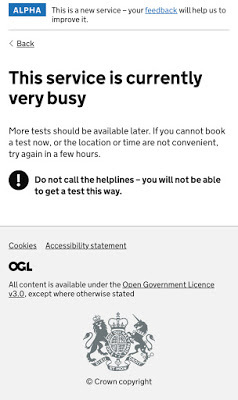
And I suppose the silver lining to all this (got to look on the bright side, haven't you?) is by the time I had been lucky and hit the jackpot, I was feeling well enough to drive. Having seen the scenes on the telly I'd expected someone dressed in a hazmat suit to lean in to the car with a long swab. Instead, we were handed self-test kits through the window (during the brief period we were permitted to wind it down) and marshalled to a far corner of the car-park, there to do the deed ourselves. Not easy in the rear-view mirror.
But, we got what they needed from the backs of our throats and up our noses and they tested it and then they told us we were covid-free. But who were 'they'? Well, perm any three from among these, I'd say:

They did have 'NHS' on their tabards... but the 'Serco' sign was bigger!
September 22, 2020
Home school...
September 10, 2020
World Suicide Prevention Day
I’ve just read a post, this post:
https://katyboo1.wordpress.com/2020/09/10/world-suicide-prevention-day/
A brave and honest post, a post that reminds me I should have written just such a post, should have been just as honest, should have been as brave because it’s World Suicide Prevention Day today and because, although it goes without saying that I’ve never done it or succeeded at it, there was a time when just one person sharing something similar might have made the world of difference to how I felt. And what I did.
But it didn’t. It wasn’t talked about back then and, if it was, it was as a sign of weakness and a cause of shame. ‘Pull yourself together’ was the kind of thing you were likely to hear, and the word ‘Suicide’ was always linked, umbilically, with ‘selfish’.
I don’t need to tell anyone reading this how wrong that was, any more than I expect to have to convince anyone that the world ain’t flat. But... it still goes on. And the secret shame is still the worst of all. So, yes... I have to write this post and nail my colours to the mast, too. In the hope that it might, just, help someone.
About a year ago I discovered a former pupil of mine had ended his own young, promising life some months before. It was a shock, doubly when you think back to times when I might have made a difference. What does make a difference? Failure, at least in my case. In others, pause. Twenty minutes, it is said, is all it takes. That means someone. Could be anyone. Me. You. Someone who can say, it’s ok to feel this way (although it isn’t, obviously), you’re not to blame and someone who, by the very fact they’re alive to say those words proves there is a chance of something better, no matter how bad or bleak it is right now.
So. Here it is. My post. Not much, I know. Not enough, for sure. But something. If we could all do something, some small thing, well... who knows what a difference we could make.
It would be worth it.
August 13, 2020
... results are in!
Confused by all the fuss over this year's 'A' level results?
Unsure why Gavin Williamson won’t countenance using predicted grades by teachers?
Worried that the mess makes a mockery of the entire education system?
Yes, me too.
Here’s what little light I can shed on things. I hope it makes it just a little clearer. It won’t, however, make it any easier to bear.
Basically, teachers are the only ones who have a hope this year of accurately assessing their pupils academic performance. Scrub that; the same applies in any year. If you think our under-funded, hopelessly administered public examinations do a better job you’ve obviously never been involved in taking them or teaching to them lately. You probably voted Brexit too and we all know how well that's going...
Public examinations, be they GCSEs, 'A' levels or even, I'd venture to suggest, degrees at a few nameless institutions are hardly worth the paper they're written on. For a start, the papers they are written on are often error strewn; they sometimes bear only the very vaguest, tangential reference (if at all) to the syllabus (which itself can be as hard to decipher as the Rosetta Stone) and they're often ‘marked’ (I used the word advisedly) by anyone the hard-pressed exam board can find, irrespective of qualifications and experience. That's if they’re actually marked at all, because exam boards pay about 0.001pence per script and are thus constantly, woefully under-prepared when all those big brown envelopes arrive.
Actually, they don’t anymore. Exam papers are scanned and sent to markers electronically with, shall we say, some ‘interesting’ results. Suffice to say that if you think this process serves the purpose of sorting the academic wheat from the chaff you’ve more faith in it than I have. If all that wasn’t bad enough I haven’t started yet on the subject of re-marks and appeals.
So why won't the government do what the government (north of the border) did and ask teachers? Ah, because... in spite of everything, they still don't trust them. In spite of creating one of the most oppressive and capricious inspection systems, in spite of constantly reforming the exam systems (along with pretty much everything else, apart from shabby, outdated and overcrowded classrooms), in spite of paying teachers by results, in spite of taking the credit for their success while at the same time stabbing them in the back by crying 'grade inflation' every August, in spite of running the system for as long as anyone can remember, certainly as long as the current cohort have actually been attending school, in spite of all that the 'government' (if it can still accurately be thus described) still haven't got it right. Teachers are trained and inspected and continually assessed to the highest standards. (Theirs - they set 'em!) Pupils are drilled in the most absurdly detailed pseudo-fragments of a subject (fronted adverbials, anyone?) in the most Gradgrindian manner just so they can be assessed (which means, of course, keeping a beady eye on what their teacher's taught them) and yet the government still can't bring itself to say, for once, "you know, folks... you know best!"
If you can read this, thank a teacher as the old NUT car sticker used to say. And if you have been (reading, that is) thanks.
But now, children, get out your pencils... AND WRITE TO YOUR MP!

July 17, 2020
Happy holidays?
Of course I'm not naive enough to think that kids stop learning just because they're not at school. Home is the best, richest and most fulfilling educational environment for children. Or it should be. I know there are countless thousands, tens, even hundreds for whom this has been time lost, through no fault of their own.
But with good fortune and the luxury of time I've been able to keep the schooling going for the past fourteen weeks. I only wish it could be longer. Because the thought of my daughter returning in September to a class of thirty in a school of over 500, or my son resuming lessons in the same physical space as 1000 other pupils fills me with terror.
In spite of all the reassurances, in spite of the super-human efforts of the schools and of my children's teachers, the risk to them, to me, to all of us, hasn't gone away. The criminally-negligent among our rulers stick rigidly to their own agenda, which has more to do with making money than with public safety. That, and doing what the hell they want while telling everyone else to toe the line. Never has the phrase 'do as I say, not as I do' been more apt.
"Politics combines all the seven deadly sins and is the forgotten eighth," as Derek Jarman wrote. But the lies and incompetence of those who actually rule over us (as opposed to the little old lady in Windsor to whom we sing so loud that she may do so long) verges on the villainous and may actually be so if only someone could or would ask the right questions.
I was screaming at the telly during Dominic Cummings Downing Street testimony: ask him why his wife couldn’t drive? Why he didn’t take the train or order a ministerial car (after all, he’s that important - he told us so!) and why he wanted to bring the family back to a place where he said he felt ‘threatened’ anyway?
But nobody did. No doubt they're all afraid they'll be denied access to the Downing Street press briefings if they rattle that particular cage, the sycophantic morons. But, really!
None of the story made sense, apart from as a fragile fabrication designed to get him off the hook of having so clearly broken the government's lockdown guidance. First he flees a house he says has been made vulnerable through media attention, then brings the same, vulnerable family back to London, driving all the way when there's the East Coast main line not twenty miles from where he was staying. And why, precisely, did he need to go so far for 'childcare'? Again, no-one asked why he couldn't have called on family and friends in the capital. We now know there were some. There were plenty of other, less nefarious, options.
But the man, like the government he advises, doesn't seem to care. Coronavirus hadn't gone away; there is, as yet, no vaccine and no cure. The return in September to the 'business as usual' state schooling of packed classrooms and inadequate buildings is a huge risk. Yes, children - especially the vulnerable - need schooling. But not at any price. There are other ways of working that work for some. Yet we're back to the 'one-size-fits-all' philosophy that has blighted education in this country for so long.
The six weeks holiday that we're now embarking on is nothing more than a historical anachronism, a sop to those Tory landowners who couldn't countenance being without a child labour force at harvest time. Still, with some decent weather, we'll have a lovely time. I'm not complaining. I, for one, know my children will keep learning, as they always do, as they have done during lockdown, without a classroom.
But come September, when I say goodbye and wave them off to school I know I'll die, just a little...
June 28, 2020
O Radiant Dawn!
'O Radiant Dawn' was the title of the motet by James MacMillan that the Stay at Home Choir rehearsed and performed with The Sixteen a few weeks ago. Last night, after a long wait, we got to see and hear the result.
Over 14,000 people in 64 countries took part. And I was one of them! It was a wonderful experience, probably something that - under normal circumstances - I'd never have been able to do. It was exciting, inspiring and uplifting. It came at the moment the first wave of good weather broke and lockdown started to seem less like a holiday and more like house arrest, especially to those (like me) with a shielding letter.
We rehearsed with Sir James himself, and then had sectionals (i.e. were split into our respective voice parts: soprano, alto, tenor, bass) with members of The Sixteen. I'll never forget Eamonn Dougan's 'Choral Chiuhuahua'... and if that means nothing to you, take a look here: https://shows.acast.com/choral-chihua....
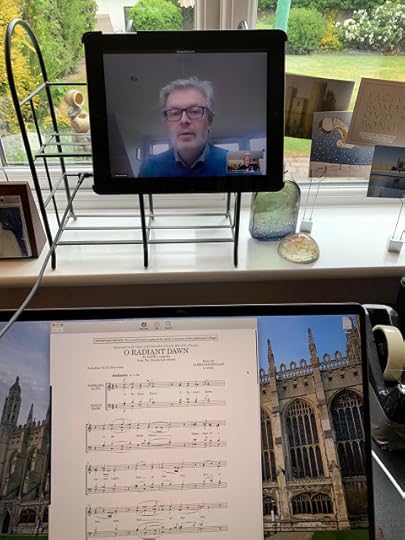
Then there was the challenge of recording - alone - to a guide track that sounded like a cross between something by Kraftwerk and my Auntie Annie on the Hammond organ. Then, finally, uploading my 'take' and waiting... and waiting.
And it was worth every moment! Here's the result. What do you think?
June 17, 2020
I Have a Song to Sing? No!
Yesterday The Guardian published a letter from eminent vocal and choral musicians, composers and conductors claiming to 'give voice to the millions of people who sing in choirs in this country' and lamenting the 'uncertain future' we all now face.
Both argued strongly that church leaders, and the government, should take action. Abbey organist James O'Donnell referred to current restrictions as 'ridiculously risk-averse' and The Guardian's correspondents argued church leaders should now 'speak out so that we can make singing together in churches work' and that the government needed to 'show how we can restart singing together on an equal footing with opening theme parks, shopping and kicking a football around.' They added 'It is imperative that we find a way for choirs in this country to resume as soon and as safely as we can.'
No-one could argue with that. But I get the impression that phrases like 'within certain guidelines' are sometimes added as a sop to the 'ridiculously risk-averse' among us who - while bitterly regretting the current situation - might be a little less keen to come back anytime soon to choral singing.
Yes, 'Singing in a choir is not only about communality, social cohesion and harmony...' There is no doubt that is provides a 'source of emotional wellbeing and positive mental health.' It is important and needs protecting. But not at the cost of people's lives.
Like many recent relaxations of the lockdown restrictions, such calls are not only disappointing, but scientifically misleading. Earlier this month the New York Times published a article which seemed to show that, far from being 'ridiculously risk-averse' the current restrictions might actually be inadequate for singers.
Of course, much is not known. But as such, is it right to begin thinking of relaxing restrictions which may silence cathedral and concert halls, but save lives? I am as frustrated with the current situation as anyone. As a former cathedral lay-clerk and active singer I miss the opportunity to make music terribly. But with underlying health conditions, and having received a shielding letter, I am also acutely aware of the need to stay safe.
The risks of relaxing the restrictions too soon are too great. And until we know better, choir practice for me will look like this for a lot longer...
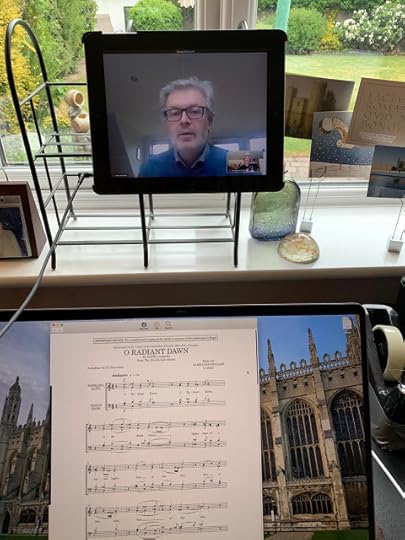
June 2, 2020
In a churchyard...
Hardy (like his protagonist Jude) didn't go to public school or Oxford. He didn't inherit wealth. He worked, as an architect. And wrote in his spare time. It was architectural business - not literary - that took him to Cornwall in 1870. While there he met the woman who was to become his wife, the woman who, over a long marriage, he would neglect and whose death he would mourn so painfully that it inspired some of the English language's best poetry.
Here's one of his poems not directly inspired by the death of his first wife. 'While Drawing in a Churchyard' is sometimes subtitled 'Song of the Yew' and it is the yew tree, that ancient tree of churchyards, that speaks to the poet. "Death isn't as bad as people think, y'know," the tree seems to say.
But then, that was Hardy's own view!
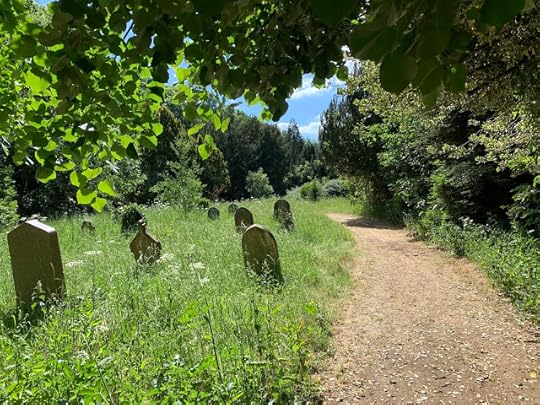
'It is sad that so many of worth,
Still in the flesh,' soughed the yew,
'Misjudge their lot whom kindly earth
Secludes from view.
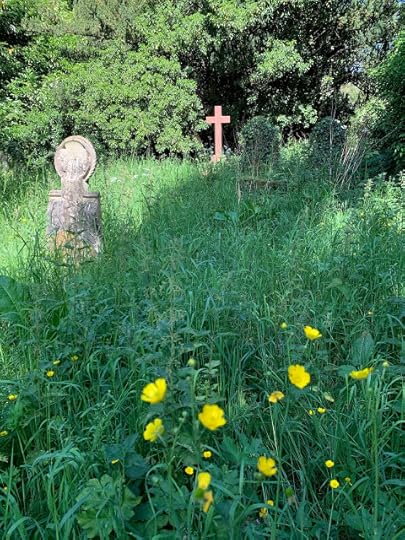
'They ride their diurnal round
Each day-span's sum of hours
In peerless ease, without jolt or bound
Or ache like ours.
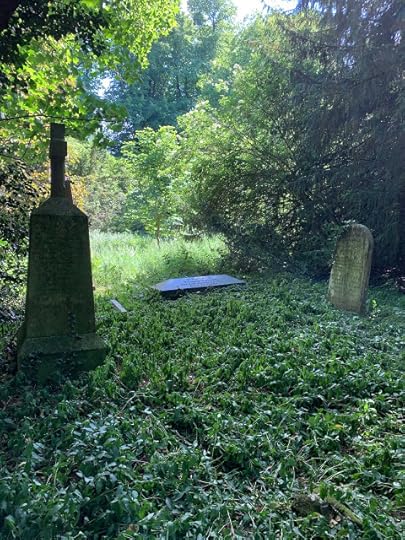
'If the living could but hear
What is heard by my roots as they creep
Round the restful flock, and the things said there,
No one would weep.'
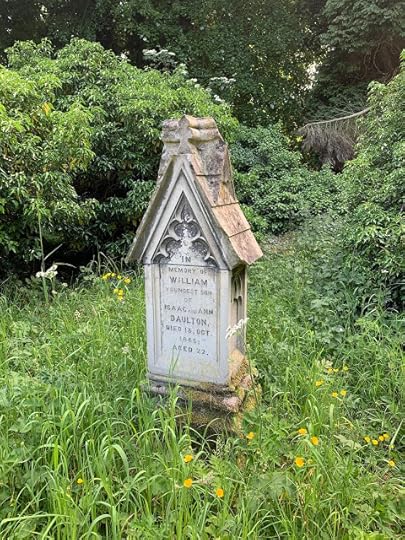
' "Now set among the wise,"
They say: "Enlarged in scope,
That no God trumpet us to rise
We truly hope." '
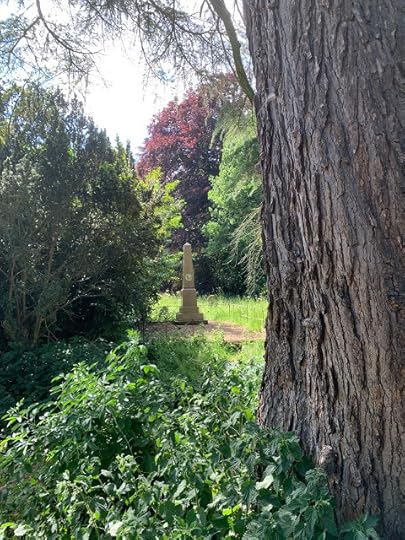
I listened to his strange tale
In the mood that stillness brings,
And I grew to accept as the day wore pale
That show of things.

